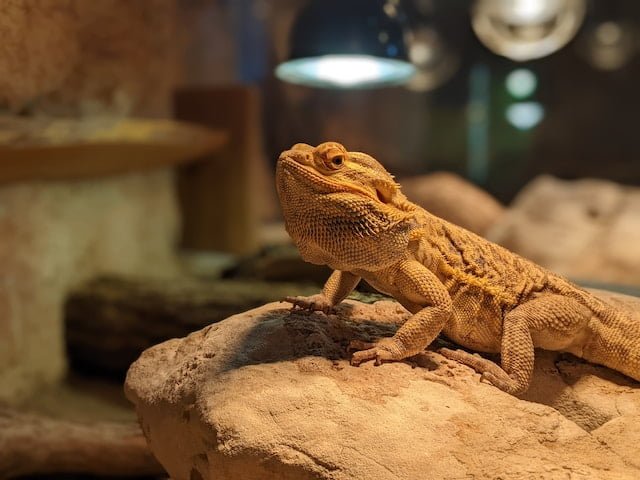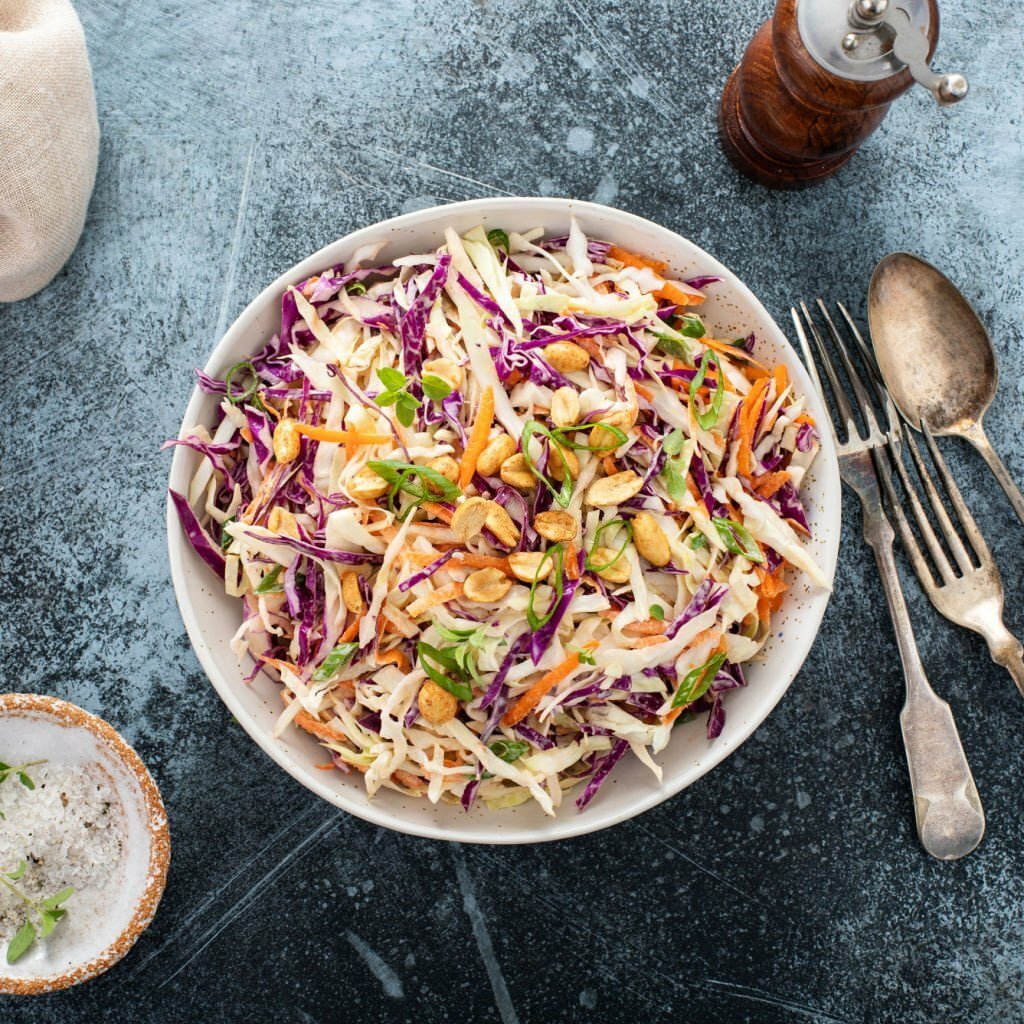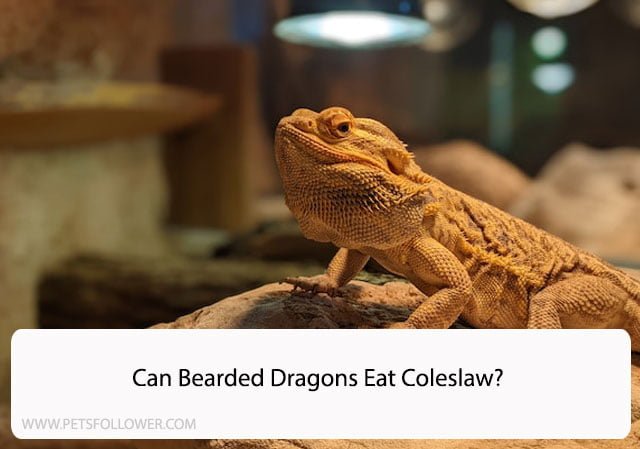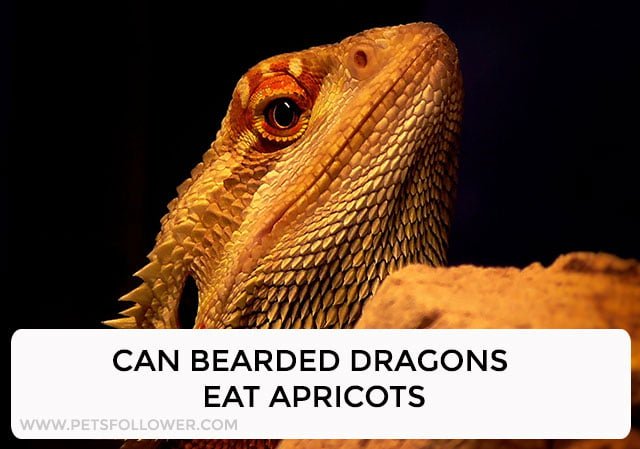Bearded dragons are fascinating reptiles known for their unique appearance and docile nature. As a responsible owner, it is crucial to understand the dietary requirements of these creatures to ensure their health and well-being. While offering a varied diet is essential, it is important to be cautious about the foods you feed your bearded dragon. In this article, we will explore whether or not bearded dragons can eat coleslaw, keeping in mind their specific dietary needs.

Understanding the Diet of Bearded Dragons
Bearded dragons are omnivorous reptiles, meaning they eat both plant-based and animal-based foods. Their natural diet in the wild consists of insects, vegetables, fruits, and some small vertebrates. It is important to replicate this balanced diet in captivity to support their nutritional needs.
The primary components of a bearded dragon’s diet include:
- Insects: These should be the main source of animal protein in their diet. Crickets, mealworms, dubia roaches, and phoenix worms are commonly offered.
- Vegetables and Greens: Dark leafy greens like collard greens, kale, and mustard greens are crucial for providing essential vitamins and minerals.
- Fruits: Bearded dragons can enjoy a variety of fruits like strawberries, blueberries, and mangoes in moderation. These should only make up a small part of their diet due to their high sugar content.
- Supplements: Calcium and vitamin supplements are necessary to ensure your bearded dragon receives adequate nutrition. These supplements can be dusted onto their insect prey or sprinkled on their greens.
Potential Risks of Feeding Coleslaw to Bearded Dragons
Coleslaw is a popular side dish made with shredded cabbage and a dressing usually containing mayonnaise or vinegar. While cabbage itself is not toxic to bearded dragons when fed in moderation, coleslaw may not be the best option for several reasons.
- Dressing: Most coleslaw dressings contain ingredients like mayonnaise, which is high in fat and can lead to digestive issues in bearded dragons. Additionally, dressings often include seasonings and additives that can be harmful to their health.
- High Water Content: Coleslaw typically has a high water content, which may not be ideal for bearded dragons. These reptiles originate from arid regions and have evolved to thrive on a drier diet. Feeding foods with high water content excessively can potentially lead to diarrhea and other digestive problems.
- Vegetable Variety: While cabbage itself is not harmful to bearded dragons, it is not the most nutrient-dense vegetable to include in their diet. There are other leafy greens and vegetables that provide better nutritional value and should be prioritized.
Conclusion
In conclusion, while bearded dragons can tolerate small amounts of cabbage in their diet, feeding coleslaw is not recommended. The dressing and high water content in coleslaw can pose potential risks to their digestive system, and there are more nutritious options available. It is always important to prioritize a balanced diet consisting of appropriate insect protein, dark leafy greens, and select fruits, along with necessary calcium and vitamin supplements for optimal nutrition. As with any dietary changes or concerns, consulting with a reptile veterinarian is recommended to ensure the health and well-being of your bearded dragon.
Nutritional Requirements of Bearded Dragons
Key nutrients for bearded dragons
Having a thorough understanding of the nutritional requirements of bearded dragons is essential to their overall health and well-being. These reptiles require a balanced diet that includes a variety of nutrients to support their growth and development. Here are some key nutrients that should be included in a bearded dragon’s diet:
- Protein: Bearded dragons are omnivorous and require a sufficient amount of protein in their diet. Good sources of protein include insects like crickets, mealworms, and dubia roaches. These should be gut-loaded or fed a nutritious diet themselves to ensure they provide the necessary nutrients.
- Vegetables: Bearded dragons also require a variety of vegetables to meet their nutritional needs. Leafy greens like kale, collard greens, and mustard greens are excellent choices because they are high in essential vitamins and minerals.
- Calcium: Calcium is crucial for the healthy growth and maintenance of bearded dragons’ bones and proper functioning of their muscles. It is important to provide a calcium supplement or dust their food with calcium powder to ensure they are getting enough.
- Vitamin D3: Bearded dragons need access to proper UVB lighting so they can synthesize vitamin D3, which is essential for the absorption of calcium. Without adequate levels of vitamin D3, bearded dragons may develop metabolic bone disease.
Balanced diet recommendations for bearded dragons
To ensure that your bearded dragon receives a well-rounded and balanced diet, here are some recommendations:
- Insects: Offer a variety of gut-loaded insects as a source of protein. These can include crickets, mealworms, waxworms, and dubia roaches. Avoid feeding wild-caught insects as they may contain pesticides or parasites.
- Vegetables: Provide a wide range of vegetables, focusing mainly on leafy greens. These can include kale, collard greens, mustard greens, dandelion greens, and bell peppers. It is best to offer a mix of different vegetables to ensure a variety of nutrients.
- Fruits: Although fruits should not make up the majority of a bearded dragon’s diet, they can be offered as occasional treats. Good options include berries, melons, and papaya. Be cautious with fruits that are high in sugar content, such as bananas and grapes.
- Supplements: Use a calcium supplement to ensure your bearded dragon is getting enough calcium. Calcium powder can be dusted on their food a few times a week. It is also important to use a multivitamin supplement occasionally to provide additional vitamins and minerals.
Remember to provide fresh water daily and ensure that it is easily accessible for your bearded dragon. It is also important to monitor their weight and overall health regularly.
By following these balanced diet recommendations and providing the necessary nutrients, you can help keep your bearded dragon healthy and thriving.
Can Bearded Dragons Eat Coleslaw?
When it comes to the diet of a bearded dragon, it’s essential to provide them with a balanced and nutritious meal. While bearded dragons can eat a variety of fruits and vegetables, it’s crucial to understand which foods are safe and suitable for their digestive system. In this article, we will examine whether coleslaw is a suitable food option for bearded dragons.
Examining the ingredients in coleslaw
Coleslaw is a popular side dish made primarily from shredded cabbage mixed with mayonnaise, vinegar, and sometimes other ingredients like carrots or onions. Let’s take a closer look at the key components and evaluate their suitability for bearded dragons:
- Cabbage: Cabbage is generally safe for bearded dragons to consume in moderation. However, it is crucial to avoid feeding them large amounts of cabbage as it can cause digestive issues such as bloating or gas.
- Mayonnaise: Mayonnaise is not recommended for bearded dragons as it contains high levels of fat and additives that may be harmful to their digestive system.
- Vinegar: Vinegar, in small quantities, is generally safe for bearded dragons. However, excessive consumption may lead to digestive issues.
- Carrots and onions: Carrots and onions are both vegetables that can be included in a bearded dragon’s diet. However, they should be fed in moderation due to their high sugar content.
Potential benefits and drawbacks of feeding coleslaw to bearded dragons
While coleslaw contains some ingredients that are suitable for bearded dragons, it also includes elements that may not be ideal for their digestive system. Here are some potential benefits and drawbacks to consider:
Potential benefits:
- Cabbage, carrots, and onions can provide essential vitamins and fiber to a bearded dragon’s diet when fed in moderation.
- The variety of textures in coleslaw may offer some enrichment and mental stimulation for your pet.
Potential drawbacks:
- The mayonnaise and vinegar in coleslaw can be harmful to bearded dragons due to their high fat and additive content.
- Excessive consumption of cabbage can lead to digestive issues such as bloating or gas.
It’s important to note that coleslaw is typically prepared with ingredients not specifically tailored for a bearded dragon’s dietary needs. Therefore, it is generally recommended to avoid feeding coleslaw to your bearded dragon to minimize the risk of potential digestive problems or other health issues.
Instead, it’s best to focus on offering a well-balanced diet consisting of appropriate fruits, vegetables, and insects that are known to be safe and beneficial for your bearded dragon’s overall health. Consulting with a reptile veterinarian or doing thorough research on suitable food options is always a good idea to ensure the well-being of your pet.
In conclusion, while coleslaw may contain some ingredients that are safe for bearded dragons, such as cabbage, carrots, and onions, the presence of mayonnaise and vinegar, along with potential digestive issues associated with excessive cabbage consumption, make it an unsuitable choice. It’s important to prioritize a varied diet of fresh and safe foods specifically catered to meet the nutritional needs of your bearded dragon.

Safe Alternatives to Coleslaw
When it comes to feeding your bearded dragon, it’s important to provide a balanced and nutritious diet. While coleslaw may seem like a harmless option, there are a few considerations to keep in mind. Let’s explore some safe alternatives to coleslaw and discuss the importance of providing a healthy diet for your bearded dragon.
Healthy Fruits and Vegetables for Bearded Dragons
Bearded dragons thrive on a diet that consists primarily of leafy greens and vegetables. Here are some safe and nutritious options to consider:
- Kale: Rich in vitamins A and C, kale is an excellent choice for your bearded dragon. Just ensure you chop it into small pieces to make it easier for them to eat.
- Collard Greens: Another great source of vitamins A and C, collard greens are also high in calcium. Be sure to remove any tough stems before offering them to your pet.
- Butternut Squash: This orange vegetable is a good source of antioxidants and fiber. Peel, cube, and cook the squash before offering it to your bearded dragon.
- Zucchini: High in water content and low in oxalates, zucchini is a safe and hydrating option for your reptile friend. Slice it into small pieces for easy consumption.
Specific Food Items to Avoid Feeding Bearded Dragons
While there are many safe and nutritious options for your bearded dragon, there are also foods that should be avoided. Here are some specific food items that can be harmful to your pet:
- Iceberg Lettuce: While lettuce may seem like a healthy choice, iceberg lettuce lacks significant nutritional value and can even cause digestive issues in bearded dragons. Opt for darker and more nutrient-dense greens instead.
- Citrus Fruits: Citrus fruits, such as oranges and lemons, are too acidic for bearded dragons. They can cause digestive upset and potentially lead to health issues. Stick to safer options like berries or melons.
- Avocado: Avocados contain a substance called persin, which is toxic to many animals, including bearded dragons. Avoid feeding them avocados to prevent any potential health problems.
- Rhubarb: Rhubarb leaves contain high levels of oxalic acid, which can be toxic to bearded dragons. It’s best to steer clear of rhubarb altogether.
Remember, it’s crucial to provide a varied diet for your bearded dragon to ensure they receive the necessary nutrients. Always consult with a veterinarian who specializes in reptiles to determine the best diet and feeding schedule for your pet.
In conclusion, while coleslaw may seem like a convenient option, it’s best to avoid feeding it to your bearded dragon due to potential ingredients like mayonnaise or cabbage that can be problematic for them. Instead, focus on providing a diet that consists of safe and nutritious options such as kale, collard greens, butternut squash, and zucchini. By offering a balanced diet, you can help ensure the health and well-being of your bearded dragon.

Conclusion
When it comes to feeding your bearded dragon, coleslaw is not recommended. While it does contain some vegetables that are safe for these reptiles, the high fat and mayonnaise content in traditional coleslaw can cause digestive issues and lead to health problems. Bearded dragons require a balanced diet that consists primarily of insects and leafy greens, with occasional supplementation of fruits and vegetables.
Final thoughts on feeding coleslaw to bearded dragons
While coleslaw may seem like a convenient option for feeding your bearded dragon, it is best to avoid it. The high fat content and the presence of mayonnaise can lead to obesity, digestive problems, and other health issues in these reptiles. It is important to prioritize a balanced diet that mimics their natural feeding habits in the wild.
Consulting with a veterinarian for dietary advice
If you have any doubts or concerns about the diet of your bearded dragon, it is always recommended to consult with a veterinarian who specializes in reptile care. They can provide accurate and tailored advice based on the specific needs of your pet. A veterinarian can guide you in creating a feeding plan that ensures your bearded dragon receives all the necessary nutrients for optimal health and growth.
Remember, responsible pet ownership includes providing a suitable diet that meets the nutritional requirements of your bearded dragon. By offering a varied and balanced diet, you can help your reptile companion thrive and lead a healthy and happy life.





